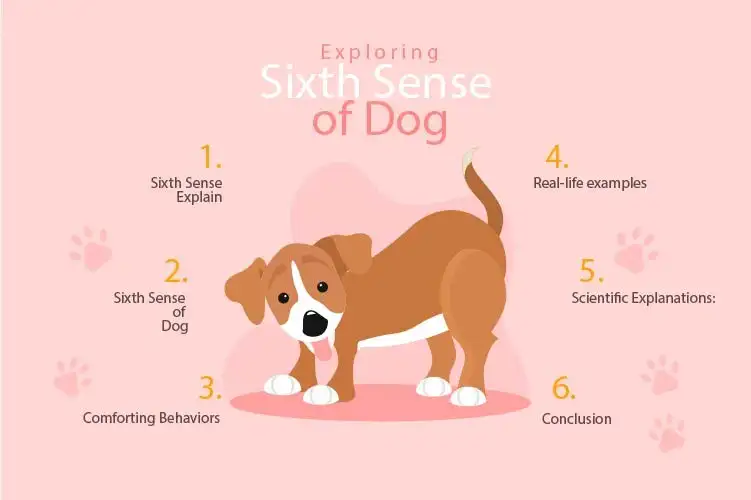Pets, particularly dogs, have historically been held in high regard due to their steadfast devotion and empathy for their human owners. Their conduct is remarkable in part because it seems like they have a sixth sense of dogs knowing when their owners are in danger. They may offer consolation and comfort when others are in need because of their intuition. We’ll examine the phenomenon of dogs having a sixth sense and the methods in which they console their owners in this blog.
The “Sixth Sense” Explained
The term “sixth sense” is frequently employed to denote an alleged capacity for seeing or sensing things that surpass the five conventional senses of taste, touch, smell, hearing, and sight. There are some phenomena that humans may interpret as having a sixth sense, even though there is no scientific proof to support this theory. Here are a few instances:
- Intuition: Because it relies on an instinctive understanding of a situation without the need of conscious reasoning, intuition is also referred to as a sixth sense. It is said to be the outcome of knowledge and past experiences being processed subconsciously.
- Extrasensory Perception (ESP): The term ESP describes the capacity to take in information using senses other than the ones that are commonly used. This comprises precognition (knowing what will happen in the future), clairvoyance (seeing distant or future events), and telepathy (mind-to-mind contact). However, there hasn’t been any solid proof of ESP’s existence offered by scientific research.
- Sensing Energy: Some people assert that they possess the capacity to detect or sense elusive energies, such as living things’ energy fields or auras. This is frequently connected to spiritual ideas or techniques like energy healing.
The Sixth Sense of Dogs
Dogs have an amazing ability to sense the emotions of their owners; they frequently pick up on tiny shifts in body language, behavior, and even scent. Their innate ability to perceive emotions is a result of their social evolution, which gave rise to their sixth sense. Dogs are able to detect signs such as these when their owners are in distress.
• Variations in voice pitch and tonality
• altered posture and body language
• elevated levels of stress chemicals like cortisol and adrenaline
• Changes in habits and conduct
Comforting Behaviors
Dogs react to their owners’ grief by engaging in consoling actions such as:
Physical Touch: Giving physical comfort and assurance through nuzzling, licking, and hugging
• Proximity: Remaining close to their owners to provide a sense of security and camaraderie; they frequently sit or lie next to them.
• Whining, whimpering, or mild barking are examples of vocalizations used to convey sympathy and worry.
• Playfulness: Starting games or presenting a beloved toy to keep their owners occupied and happy.
• Empathetic Gazing: Maintaining eye contact, as if to say, “I’m here for you, and I understand.”
Real-life examples
Turkey EarthQuake
Some locals observed strange behavior from dogs in the days preceding the catastrophic 7.8 magnitude earthquake that rocked southern Turkey on February 6, 2023. A video that was posted on one resource went viral and showed a dog becoming uncomfortable and restless in the hours leading up to the earthquake.
The dog can be seen in the video whining and not settling down even when her owners try to soothe her.
John and His Dog, Atlas: Their Story
John was a veteran who experienced anxiety and PTSD following his return from war. He felt overwhelmed and detached from reality one day during a severe manic episode. When Atlas, his devoted and perceptive German Shepherd, noticed John’s suffering, he acted right away.
With a gentle whimper, Atlas cuddled up next to John and nuzzled his hand, seemingly expressing, “I’m here for you, John.” You’re not by yourself. John started to pet Atlas because it made him feel secure and at ease, and gradually his fear went away. Atlas stayed by John’s side, offering consolation, till John started to feel rooted once more.
Ever since, Atlas has been John’s emotional support animal, going to therapy with him and offering consolation when he’s feeling nervous. John feels that Atlas has been a great assistance in overcoming his PTSD and finding calm during difficult moments.
This touching instance demonstrates the enormous influence dogs may have on our lives by providing consolation, encouragement, and unwavering love at our most vulnerable moments.
The Story of Sarah and Her Dog, Lucy
Sarah experienced anxiety and melancholy following the death of her mother. Sarah’s dog, Lucy, a kind and perceptive Golden Retriever, became her constant friend after sensing her emotional suffering. Lucy would curl up next to Sarah whenever she was feeling down, licking away her tears and offering consolation. Sarah started to recover and experience joy once more with Lucy at her side.
The Story of David and His Dog, Rocky
David was an automobile accident survivor who experienced anxiety and persistent pain. Rocky, his devoted and perceptive Bulldog, sensed David’s discomfort and changed his behavior to reassure him. Rocky would lie next to David during excruciating moments, his serene demeanor easing David’s tension and discomfort.
The Story of Emily and Her Dog, Bella
Emily, a college student, battled PTSD after going through a horrible encounter. Emily’s Poodle, Bella, who is affectionate and watchful, recognized her dread and anxiety and adopted her as an emotional support animal. Bella gave Emily comfort and stability while accompanying her to therapy sessions, assisting Emily in overcoming her trauma.
The Story of Mark and His Dog, Duke
PTSD and nightmares plagued Mark, a soldier when he got back from war. When Duke, his devoted and consoling Labrador Retriever, sensed that Mark was upset, he went to lie next to him, offering him comfort and lessening the intensity of Mark’s nightmares.
These anecdotes highlight dogs’ amazing capacity to recognize and meet their owners’ emotional needs, offering consolation, encouragement, and unwavering love during trying times.
You may also interested in “Unlocking Calm: Dog Anxiety Treatment Strategies That Work”
Scientific Explanations:
Dogs are renowned for having extraordinary senses, including the capacity to perceive things that people are not able to. Although some call this a “sixth sense,” their enhanced perceptions and instincts provide a more fitting explanation. The following are some scientific justifications for dogs’ remarkable abilities:
- Enhanced Smell: Dogs have up to 300 million olfactory receptors, compared to just 6 million in humans, giving them a far stronger sense of smell than humans. This enables them to distinguish between various scents and sense fragrances at much lower intensities. They can also identify certain illnesses by smelling variations in a person’s body odor, including diabetes or cancer.
- Superior Hearing: Compared to humans, dogs can hear more frequencies and farther away. They have far larger hearing ranges and can detect noises at higher frequencies. Because of this, they are able to hear faint sounds before others do, like footsteps approaching or distant thunderstorms.
- Sensitivity to Body Language: Dogs have a keen sense of body language in humans and are able to read small clues that we might not even be aware of. They are able to interpret our intentions and feelings by detecting subtle changes in our posture, facial expressions, and even scent.
- Intuition and Instincts: Over thousands of years of coevolution, dogs have developed a profound comprehension of human behavior and requirements. They seem to be able to forecast our next move since they can anticipate our behaviors and respond appropriately. Their acute observation and innate reactions are more likely to be the cause of this than any supernatural talent.
- Empathy and Bonding: Dogs are remarkably good at forming deep emotional relationships and having empathy for people. They are sensitive to our emotions and react with love and support when we’re depressed, nervous, or in need of consolation. They are able to offer a sense of safety and friendship that is beyond their bodily senses because of this relationship.
Dogs possess amazing senses and instincts, which are founded in their biology and evolutionary history, despite the fact that the term “sixth sense” may be a catchy way to express these extraordinary skills. Through examining and valuing these scientific justifications, we can get a more profound comprehension of the distinct connection between canines and humans.
Conclusion
Dogs possess a sixth sense, which allows them to sense emotions and provide comfort during distress. This sense is linked to intuition, extrasensory perception (ESP), and sensing energy. Dogs can detect changes in voice pitch, tone, posture, body language, and stress chemicals like cortisol and adrenaline. They respond to their owners’ grief by engaging in consoling behaviors such as physical touch, proximity, vocalizations, playfulness, and empathetic gazing. Dogs have enhanced perceptions and instincts, including enhanced smell, superior hearing, sensitivity to body language, intuition, and bonding. They have up to 300 million olfactory receptors, a stronger sense of smell than humans, and can distinguish between various scents. Their intuition and instincts have evolved over thousands of years, allowing them to anticipate our next move and respond appropriately. Dogs are also adept at forming deep emotional relationships and having empathy for people.



I love how easy it is to navigate your site.
I do agree with all the ideas you have presented in your post. They’re really convincing and will definitely work. Still, the posts are too short for beginners. Could you please extend them a little from next time? Thanks for the post.
Wow, fantastic blog layout! How long have you been blogging for? you made blogging look easy. The overall look of your site is fantastic, as well as the content!